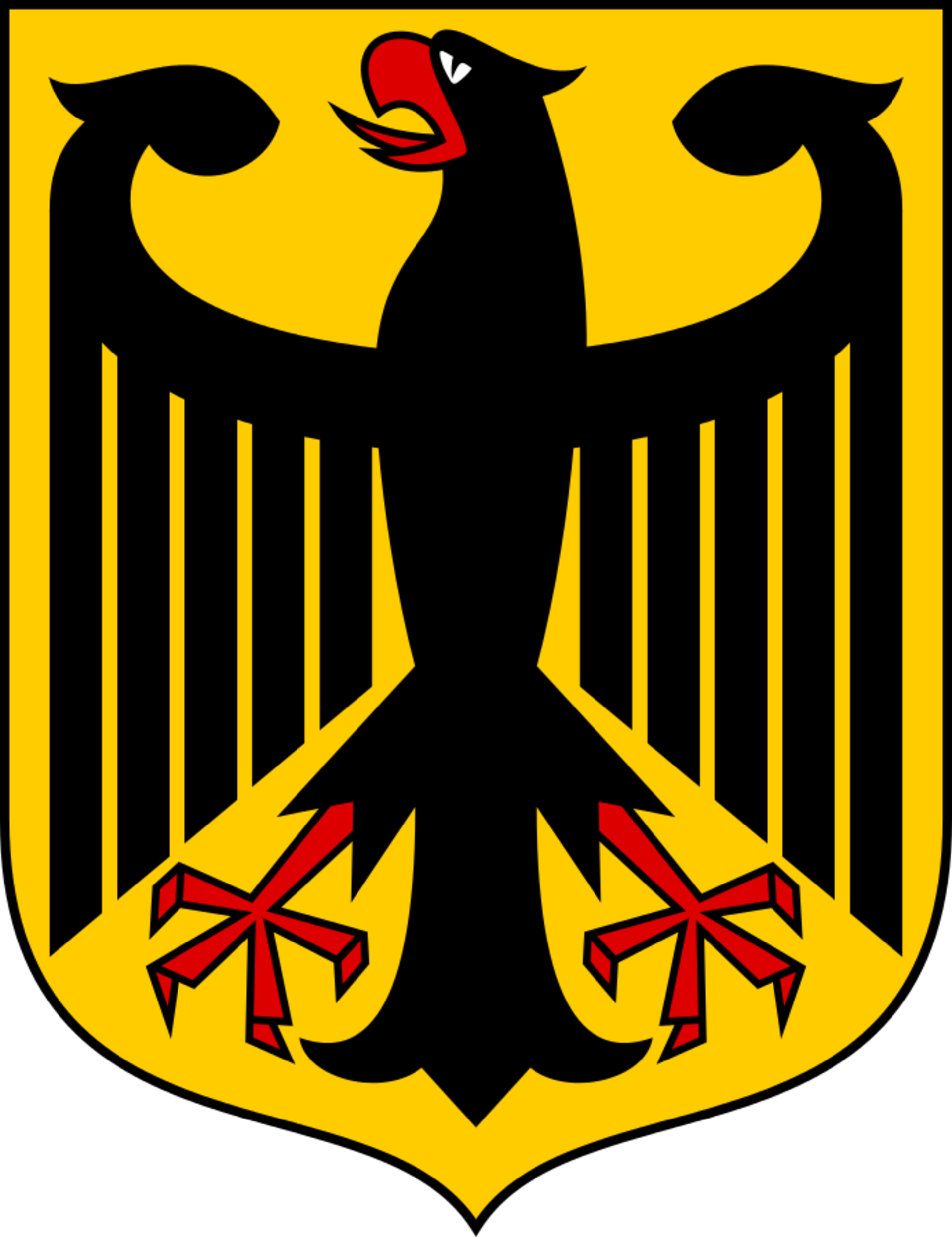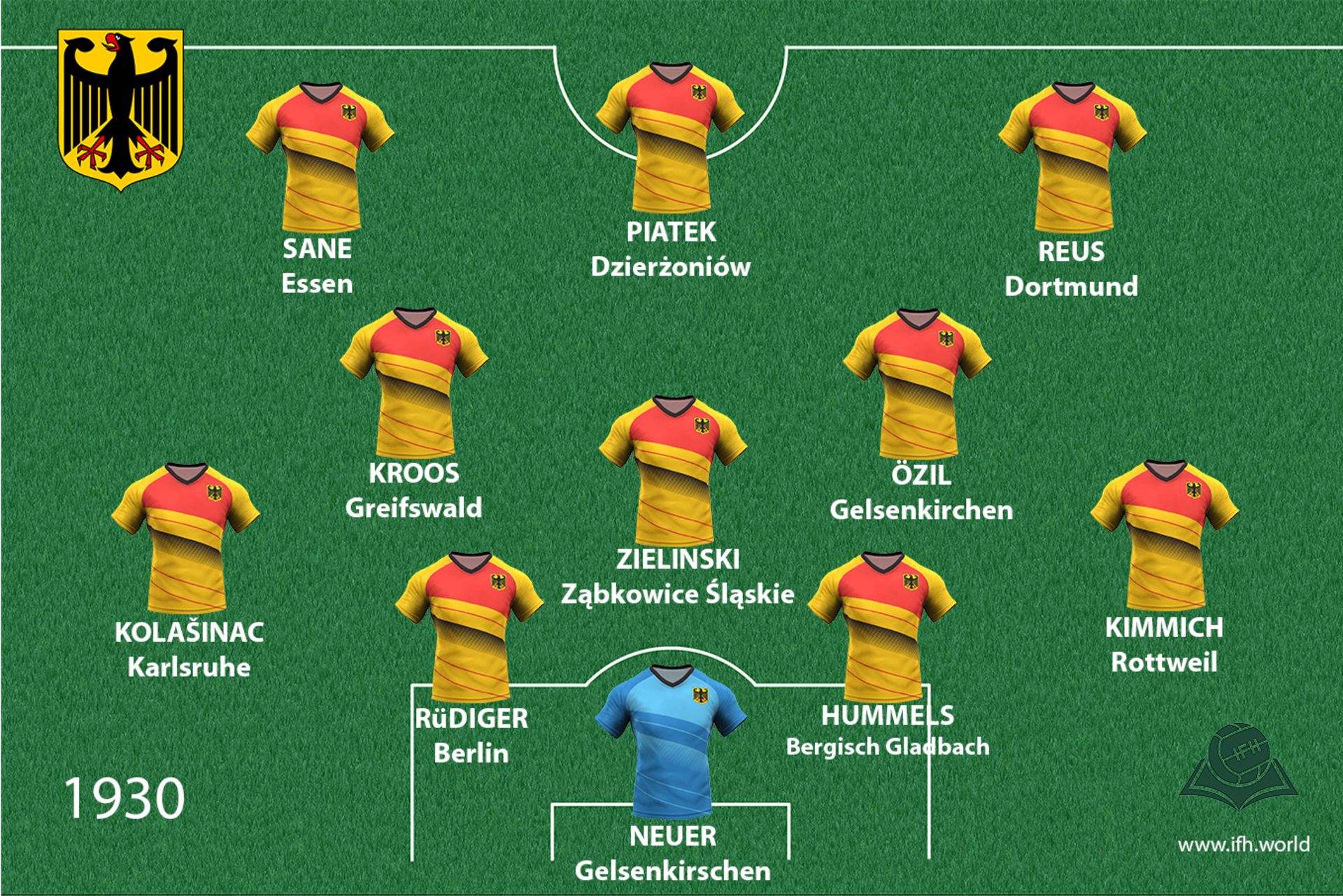Republic of Germany
After the defeat in World War I, Germany stopped being an empire and was proclaimed a republic. The term Weimar Republic (after the city it was created in) would be used for it in the period of its existence (1919-1933).

Coat of arms
Shirt
| Position | First name | Last name | Mjesto rođenja | Like | Dislike | |
|---|---|---|---|---|---|---|
| GK | Lukasz | FABIANSKI | Poznan |
3 |
1 |
|
| GK | Manuel | NEUER | Gelsenkirchen |
26 |
7 |
|
| GK | Marc Andre | TER STEGEN | Mönchengladbach |
24 |
1 |
|
| DC | Mats | HUMMELS | Bergisch Gladbach |
11 |
1 |
|
| DC | Niklas | SÜLE | Frankfurt am Main |
32 |
5 |
|
| DRC | Antonio | RUDIGER | Berlin |
3 |
1 |
|
| DRC | Jerome | BOATENG | Berlin |
6 |
5 |
|
| DRC | Shkodran | MUSTAFI | Bad Hersfeld |
16 |
7 |
|
| DR | Cedric | SOARES | Singen |
4 |
1 |
|
| DL | Jonas | HECTOR | Saarbrücken |
8 |
1 |
|
| DL/DMC | Sead | KOLAŠINAC | Karlsruhe |
15 |
4 |
|
| DMC | Grzegorz | KRYCHOWIAK | Gryfice |
8 |
4 |
|
| DMC | Piotr | ZIELINSKI | Ząbkowice Śląskie |
10 |
2 |
|
| DMC/DRLC | Emre | CAN | Frankfurt am Main |
13 |
2 |
|
| DMC/DR | Joshua | KIMMICH | Rottweil |
16 |
5 |
|
| MC | Julian | WEIGL | Bad Aibling |
15 |
1 |
|
| MC | Leon | GÖRETZKA | Bochum |
11 |
0 |
|
| MC | Sami | KHEDIRA | Stuttgart |
13 |
3 |
|
| MC | Toni | KROOS | Greifswald |
14 |
1 |
|
| AMC | Hakan | CALHANOGLU | Mannheim |
8 |
4 |
|
| AMRLC | Julian | DRAXLER | Gladbeck |
16 |
3 |
|
| AMRLC | Leroy | SANE | Essen |
9 |
1 |
|
| AMRLC | Mesut | ÖZIL | Gelsenkirchen |
16 |
4 |
|
| AMRL | Marco | REUS | Dortmund |
26 |
1 |
|
| SS/FC | Lukas | PODOLSKI | Gliwice |
12 |
1 |
|
| SS/FC | Thomas | MÜLLER | Weilheim in Oberbayern |
19 |
4 |
|
| FC | Krzysztof | PIATEK | Dzierżoniów |
4 |
0 |
|
| FC | Maximilian | PHILLIPP | Berlin |
3 |
6 |
|
| FC | Timo | WERNER | Stuttgart |
18 |
1 |
Germany was greatly harmed by the peace treaty in Versailles. It lost 1/7 of an economically important territory, numerous Germans became minorities in newly created neighboring countries, its transoceanic colonies were taken, and its army was reduced while its navy was taken. Furthermore French and Belgian troops soon after occupied Ruhr, the heart of Germany’s mining, industry and trade, in order to ensure that war reparations were paid in kind such as coal.
During this entire period, the socio-political situation was mostly unstable. Hard life was exacerbated by huge war reparation imposed by the Paris peace treaties after the war and Allied bankers who then “found solutions” for payments (in the form of short-term loans) that led to even greater debt. Inflation deprived the middle class of all savings and made industrial magnates absolute dictators of Germany’s economic life. The Germans themselves did not feel defeated in the war (after all, Germany was not conquered) and felt even less like they earned this defeat. Persistent opponents of the Weimar Republic convinced themselves that republicans, having removed the Kaiser and surrendered to the Entente, were responsible for the defeat of Germany and the difficult peace treaty.
The conditions in Germany were made worse with the start of the Great Depression in 1929. There was danger of a social revolution of the working class and streets became literally unsafe due to conflicts between paramilitary groups. Masses of disappointed, disoriented and disgruntled citizens had no idea who to be loyal to. In these conditions, the Nazis rose, led by Adolf Hitler who would become chancellor in 1933. A year later, after the referendum where more than 90% voters voted for it, the functions of chancellor and president were unified – Hitler became Führer.
Sources
- Georges BENSOUSSAN, Europska strast za genocidom : povijest genocidnih ideja i djela, Zagreb, 2010.
- Michael BURLEIGH, Treći Reich : nova povijest, Zaprešić, 2012.
- Grupa autora, Povijest: Prvi svjetski rat i poslijeratno doba (1914. - 1936.) , knjiga XVI., Zagreb 2008.,
- Alaster HAMILTON, Fašizam i intelektualci : 1919-1945., Beograd, 1978.
- Eric J. HOBSBAWM, Doba ekstrema : kratko dvadeseto stoljeće 1914.-1991, Zagreb, 2009.
- David ICKE, I istina će vas osloboditi, Zagreb, 2009., 19
- B.TOMIĆ, ''Ekonomska analiza: Nekreditna emisija, javna potrošnja i inflacija u modernom monetarnom sustavu'', http://www.advance.hr/vijesti/ekonomska-analiza-nekreditna-emisija-javna-potrosnja-i-inflacija-u-modernom-monetarnom-sustavu/
- Coat of arms https://en.wikipedia.org/wiki/File:Coat_of_arms_of_Germany.svg
